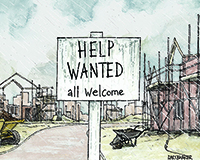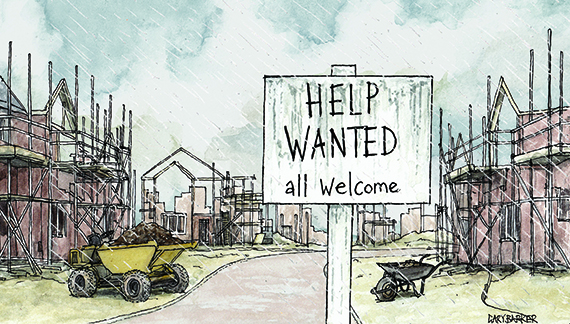I’ve been looking at two startling facts in the past week. The migrant crisis facing Europe is harrowing, and calls on us to look to our humanity and share our space and wealth with those in desperate need.
Over the kitchen table, a conversation between my husband and I went something like this:
Me: “We’ve got a spare room – surely there’s an app so we can share it with a migrant family who really need it?”
Husband: “How long are they staying for?”
Me (stumped expression): “Good point – until they can afford to move to space of their own.”
Husband: “Ten past never, then. We need some housing in this country that they could afford – maybe they could build that.”
And there it is in a nutshell. We have a country with an urgent housing need, a migrant supply that needs work and homes, and a political and social will to share.
I can’t help feeling there is a tech solution to this challenge to create a marketplace to make this happen.
But then, there’s also a dangerous dogma. While there is a desire to share our space and welcome migrants in some quarters, there are those who are already opposing development in their neighbourhoods and backyards.
Constraining real estate supply by opposing planning consents preserves property values.
There are very real reasons why people oppose new development – wanting to preserve their house prices, vista, amenity, neighbourhood, communities, values, and so on.
And this is before we have added migrant settlements to the mix.
If we don’t solve the supply of affordable housing in this country – by which I mean homes that average families on average incomes can find attainable – then we will make migrants of all of us, and our society will be further polarised into the haves and have-nots.
One of the unintended consequences of 25% affordable housing mandates in new schemes is that, by definition, a developer must pay for them through other sales, which means they need to be at the top end of the market to subsidise the affordable element, or add more units in the middle tier.
This leads to dense developments that are often opposed at the planning committee stage as not being “in keeping” or overloading development sites.
As I watch planning disputes in London, I cannot help but feel that we need to go back to our core values of sharing with those in need.
And we need to share with more than our wallets to keep the problem somewhere else, and share our space, whether it be temporarily or more permanently with sites for migrants, but also provide places for people who are already here and just want a home of their own.
Shelter is a basic human right, and one that our industry has a moral obligation to provide. Perhaps the rest of society can join us in sharing their space so that there is room for all of us.
Juliette Morgan is partner, Cushman & Wakefield; head of property, Tech City UK












